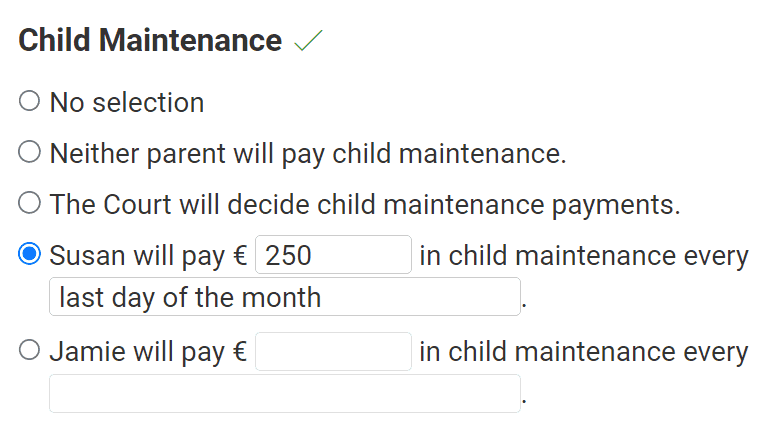Child Maintenance in Ireland (Child Support)
Parents must support their children financially. When they split up, this usually means one pays child maintenance to the other.
Generally, the noncustodial parent is the payer. If parents have joint custody, one is named the primary carer — usually the parent who has more time with the child — and they're the one who receives maintenance. If parents spend equal time with the child and have similar incomes, maintenance may not be necessary.
Maintenance is generally paid until the child turns 18 years old, or until they turn 23 if they remain in schooling full time. It might continue longer for a child with a mental or physical disability who cannot support themself.
Paying maintenance does not automatically give you guardianship, custody or access to your child. Those issues can be decided separately or at the same time as maintenance.
Calculating child maintenance in Ireland
Ireland does not have a child maintenance formula.
If you ask the court to decide the amount, it will consider both parents':
- Income and earning capacity
- Property and other financial resources
- Expenses, including from children from other relationships
- Custody and access time (Calculate your exact time with Custody X Change.)
If you reach an agreement on how much maintenance you should pay, take the same factors into account. Your goal should be to cover each child's costs (both current and potential) while leaving both parents with enough money to meet their other obligations and needs.
Ways to get a child maintenance arrangement
There are several ways to decide on a child maintenance arrangement.
By court order
You may go to court just for a maintenance order, or you may ask the court to decide maintenance as part of a case about custody or divorce.
You'll have to attend a hearing. Bring documents that prove the details of your financial situation.
By legal agreement
You might write up a legal agreement, e.g. a parenting plan, by yourselves, or you can have a mediator or solicitor write it for you. If you're having difficulty agreeing on terms, then going to a mediator together or each hiring a solicitor can be useful as they'll help you negotiate.
There aren't many rules for maintenance agreements. For instance, they can involve monthly or weekly payments, a lump sum payment and splitting of child-related costs. However, they cannot prohibit either parent from applying for a maintenance order in the future.

You can customise this to fit your situation with Custody X Change.
If you want your agreement to be enforceable like a court order, you can apply to make it a rule of court. You'll have to attend a hearing where a judge will decide if the agreement seems good for the child.
Applying for a rule of court follows the same process as applying for a maintenance order (explained below).
Informally
This means you have an agreement but not a document with both parents' signatures. You might not even have your agreement in writing. This is the riskiest option as it gives you no proof of the agreement and no help enforcing it.
Applying for child maintenance
Whether you can't agree and need a maintenance order or do agree and need a rule of court, most applications are made to the District Court. It can award maintenance of up to €150 a week per child.
If you are asking for a higher payment, apply to the Circuit Court or High Court.
Apply to the court office in the area where you or your co-parent lives or works. Once you do, you'll serve case paperwork on the other parent and give the court proof that you've done so.
Paying and receiving child maintenance
Your order or agreement should specify how payments will be made and how often. Record each payment in your Custody X Change expense tracker or a spreadsheet in case there's an issue.
If the payer fails to pay and you have a maintenance order or a rule of court, you can turn to the court for enforcement. It might make an attachment of earnings order (which requires the payer's employer to deduct maintenance from their paycheck) or hold the payer in contempt of court.
Changing and ending child maintenance
If you do not have a maintenance order or rule of court, you can agree to change or end maintenance at any point. It's a good idea to put your new agreement in writing and both sign.
If you do have a maintenance order or rule of court, either parent may reapply to the original court to vary (i.e., change) or discharge (i.e., end) it.
The court might also vary the maintenance amount during an enforcement proceeding if it finds that the family has new circumstances.
Keeping track of payments and expenses
Whether you're a custodial or noncustodial parent, the Custody X Change online app can help you keep track of maintenance payments and child-related expenses.

You can customise this to fit your situation with Custody X Change.
Log details of every payment or expense into your parenting expense tracker to ensure you're on time and have a record.
When you're owed money, share an expense report with the other parent — either digitally or on paper. This is just one way Custody X Change makes co-parenting simpler.
